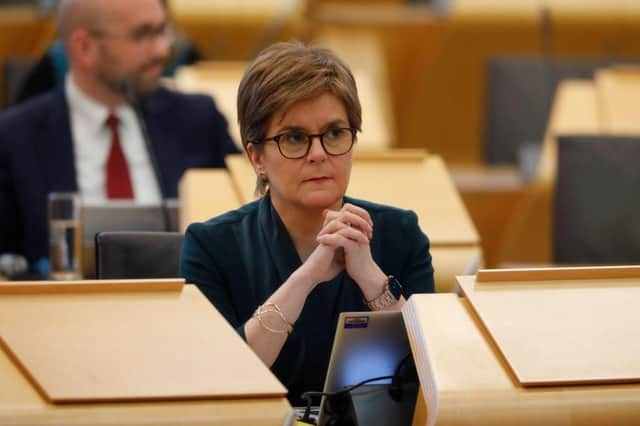2023 begins with the First Minister in rough waters - Euan McColm


The First Minister’s focus as we step into 2023 may be on planning how the SNP can treat the next UK General Election as a “de facto” referendum on independence but one of Scotland’s most senior religious figures refuses to give the strategy his blessing.
Interviewed by The Scotsman last week, the Rt Rev Dr Iain Greenshields - moderator of the Church of Scotland - was clear in his view that Sturgeon’s plan was not legitimate.
Advertisement
Hide AdAdvertisement
Hide AdThe constitutional division that has darkened Scottish debate since the 2014 independence referendum was, he said, not healthy for society, adding that a General Election was about much more than the constitutional question.
It is undoubtedly the case that the Church’s influence on Scottish society is not what it once was but Greenshields’s intervention was, nonetheless, unhelpful to the First Minister’s cause.
A week before Christmas, Sturgeon told members of the SNP’s ruling national executive committee that a discussion about the push for independence - to take place at a special conference in March - was the most important since 1997, when the party decided to back devolution.
Back then, Sturgeon was on the side of those nationalists who believed in a step-by-step approach towards the break-up of the United Kingdom. Today, she is the champion of a reckless strategy that could bring about her political demise.
The simple fact of the matter is that, after years when the SNP enjoyed an unprecedented degree of unity, the party is split over Sturgeon’s plan, drawn up after the Supreme court confirmed the Scottish Government does not have the power to run a second independence referendum without the agreement of UK ministers.
Those who are sceptical about its chances of success have good reasons.
For one thing, the target set is high. For Sturgeon to claim victory, more than 50 per cent of voters will have to back pro-independence parties, something which has happened only once before, when the nationalists were on a post-referendum high in 2015. That year - when the SNP took 56 of Scotland’s 59 constituencies - the party, along with their fellow nationalists, The Scottish Greens, and others won 51.3 per cent of the vote.
But even if the nationalists can repeat this feat, there would be nothing to compel the UK government to enter into the separation negotiations Sturgeon proposes she would initiate. The new Prime Minister would be perfectly entitled to point out that there is no such thing a “de facto” referendum and that Sturgeon has no mandate for independence.
Advertisement
Hide AdAdvertisement
Hide AdAnd if nationalist parties fall short of that 50 per cent target, be sure their Unionist opponents will say, well, you had your second referendum and you lost. Not fair? Tough. Politics is a rough old game and that’s how it’ll play out and Sturgeon won’t be able to cycle back.
Sturgeon has never been a collegiate leader. Rather, she surrounds herself with a small clique - comprising the SNP’s chief executive (and her husband) Peter Murrell, deputy First Minister John Swinney, and a few trusted advisers - and then rules by diktat. But the years when what Sturgeon said went are drawing to a close. She can no longer be confident that her colleagues will simply do as they are told.
Take, for example, Stephen Flynn, the MP who recently ousted and replaced the SNP’s Westminster leader Ian Blackford. Flynn is said to be one of those sceptical about the wisdom of Sturgeon’s plan. The First Minister can ill afford division over her strategy but Flynn is not close her and she cannot bank on him - or his supporters - falling into line.
Shortly after she was elected to succeed her mentor, Alex Salmond, as First Minister, Sturgeon had her spin doctors brief it was her view that a second referendum should only take place when support for independence had been polling at 60 per cent or more for a period of six months. If Scotland was to go it alone, then she wanted a clear mandate rather than scraping a narrow victory that would leave the country more bitterly divided than ever.
There was wisdom in this but that wisdom is long gone. These days, Sturgeon looks tetchy and desperate. Frustrated that too few voters have seen the nationalist light and running out of time, she proposes a high-risk strategy that, regardless of the result of the next General Election, will not trigger the break-up of the UK but will deepen the division that has cast its shadow over Scotland for the past eight years.
As the SNP’s special conference approaches, Sturgeon will have other issues to deal with, not least the ongoing fall-out from Holyrood’s pre-Christmas decision to make it easier for people to change their gender in law.
The UK government may yet block the introduction of self-ID for trans people on the grounds that it may collide with aspects of the Equality Act, including the provision of single-sex spaces for women.
If this happens, the First Minister will argue - of course - that it’s evidence of the UK government treating Scotland and its parliament with contempt. However, with polls showing a majority of Scots opposed to the introduction of self-ID, this argument may have limited power. Many - including a number of feminist groups - would be quite happy to see this particular piece of legislation scuppered.
Advertisement
Hide AdAdvertisement
Hide AdAnd so 2023 begins with the First Minister in rough waters. How the mounting chaos surrounding Nicola Sturgeon is going to persuade those sceptical about independence to change their minds is not at all clear.
Comments
Want to join the conversation? Please or to comment on this article.